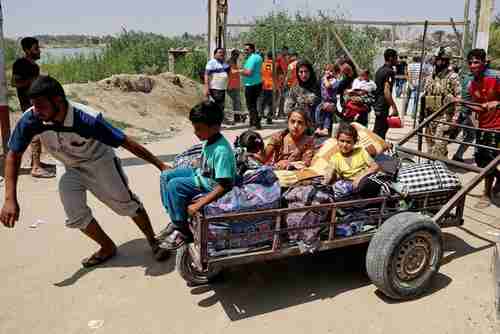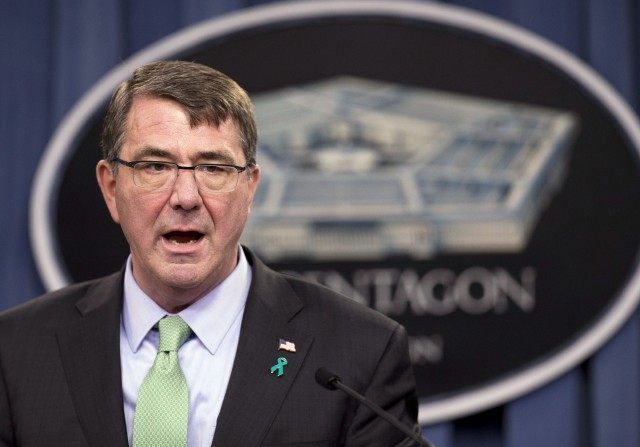This morning’s key headlines from GenerationalDynamics.com
- US administration’s strategy in Iraq continues to fail
- Obama administration’s rhetoric changes dramatically on Sunday
- Some reports suggest intentional loss of Ramadi by Iraq’s government
US administration’s strategy in Iraq continues to fail

Iraqis fleeing Ramadi on Sunday (AP)
Last year, the Islamic State (IS or ISIS or ISIL or Daesh) stunned the world by seizing Mosul in Iraq. The Iraqi soldiers who were supposed to defend Mosul simply dropped their weapons and fled as the ISIS militias approached.
President Barack Obama had withdrawn all troops from Iraq in December 2011, and had assured the world that Iraq could take care of itself, without needing American troops. However, as ISIS scored major victories in Iraq, Obama was forced to change his position. On June 19, he said:
We’re prepared to send a small number of additional American advisors, up to 300, to assess how we can best train, advise and support Iraqis security force forces going forward I think we always have to guard against mission creep, so let me repeat what I’ve said in the past — American combat troops are not going to be fighting in Iraq again.
Since then, President Obama has been forced to announce several increases in troop deployments, though always special forces and not “ground troops.”
There have also been American airstrikes in Iraq and Syria, but many analysts say that they are almost completely ineffective. Some reports indicate that the pilots often return to base without having launched any airstrikes because of a lack of suitable targets.
One of the reasons that suitable airstrike targets cannot be identified is that Obama has not permitted US soldiers to be on the ground acting as “forward air controllers,” who identify the targets on the ground then communicate their locations to the aircraft.
In the last two weeks, ISIS has scored several additional stunning victories.
On Sunday, ISIS took full control of a border crossing between Iraq and Syria. Earlier, ISIS captured the historic city of Palmyra in Syria, and the city of Ramadi in Iraq. This gives ISIS full control of the two main roads between Syria and Iraq’s province of Anbar. The National (UAE) and Economist
Obama administration’s rhetoric changes dramatically on Sunday
Initially, President Obama referred to the stunning seizure of Ramadi as a temporary “tactical setback,” but on Sunday, the tone of the rhetoric from the Obama administration changed sharply. Secretary of Defense Ashton Carter, appearing on CNN, gave a scathing criticism of Iraq’s army after its defeat in Ramadi:
What apparently happened was that the Iraqi forces just showed no will to fight. They were not outnumbered but in fact they vastly outnumbered the opposing force, and yet they failed to fight. They withdrew from the site. And that says to me, and I think to most of us, that we have an issue with the will of the Iraqis to fight ISIL and defend themselves.
Now, we can give them training, we can give them equipment; we obviously can’t give them the will to fight. But if we give them training, we give them equipment and give them support and give them some time, I hope they will develop the will to fight, because only if they fight can ISIL remain defeated.
Carter also agreed that airstrikes have not been very effective:
Air strikes are effective but neither they nor really anything we do can substitute for the Iraqi forces’ will to fight.
They’re the ones who have that to beat ISIL and keep then keep them beaten. We can participate in the defeat of ISIL but we can’t make Iraq run as a decent place for people to live. We can’t sustain the victory. Only the Iraqis can do that, and in particular, in this case, the Sunni tribes to the west.
If there comes a time when we need to change the kinds of support we’re giving to the Iraqi forces, we’ll make that recommendation. But what happened at Ramadi was a failure of the Iraqi forces to fight. And so our efforts now are devoted to providing their ground forces with the equipment, the training, and to try to encourage their will to fight so that our campaign enabling them can be successful both in defeating ISIL and keeping ISIL defeated in a sustained way.
During Sunday’s interview, Carter said that there are still no plans to use forward air controllers.
On the Sunday talk shows, both Democrats and Republicans criticized Obama’s strategy in Iraq, with several calling the situation “a stalemate.” One Democrat urged Obama to supply the Kurdish Peshmerga and Sunni tribesmen in Iraq, who she said are “literally begging, for arms, heavy weapons and ammunition” to defeat ISIS and protect their land and families.
One Republican, Illinois Rep. Adam Kinzinger, called for much more aggressive military action:
You are not losing and you are not winning because we are not really engaged in this fight.
At some point, we’re going to have to understand that the goal is the destruction of ISIS. … We have to understand that every day that goes by where we don’t push this cancer back … the cost of liberating Iraq or the cost of defeating this cancer is only going to increase.
The scathing, undiplomatic criticism of Iraq’s army by the Secretary of Defense, combined with criticisms of Obama from all sides, suggests that there is going to be a significant change of policy in the next few days. However, he will certainly try anything rather than ground troops, as that would be the ultimate humiliation after having suffered a long string of foreign policy humiliations, one after the other. CNN and The National (UAE) and Fox News
Some reports suggest intentional loss of Ramadi by Iraq’s government
There are some reports that indicate that ISIS’s seizure of Ramadi was accomplished with the help of Iraq’s government in Baghdad, or at least with its intentional neglect.
According to a top Kurdish commander who fought the ISIS militias in Ramadi, he had received intelligence five days before the attack on Ramadi that 400 armed ISIS vehicles had entered Iraq from Syria, and at least 200 were headed for Ramadi. The commander asked his superiors in Baghdad to arrange for airstrikes to take out the vehicles, which would presumably have been easy targets. But no air strikes occurred.
Instead, ISIS sent 50 suicide bombers into the Iraq army defense lines. The suicide bombers had arrived from Syria. After that, seizing Ramadi was an easy victory for ISIS.
According to one Iraqi analyst, Baghdad’s support of the Ramadi defenses was so bad, it must have been intentional. He suggests that any support for the Iraq army and the Sunni tribes in Ramadi would require giving weapons to Sunnis, which Baghdad did not want to do. Instead, Baghdad wanted the entire operation against ISIS to be conducted by Shia militias under the command of Iran’s Al Qods Brigades commander Qassam Soleimani.
Arguing against this analysis is the fact that Soleimani was handily defeated by ISIS at the battle of Tikrit, and was forced to flee back to Tehran. Bringing him back to lead the fight in Ramadi would have to be considered a big risk. Rudaw (Iraq) and Middle East Briefing
KEYS: Generational Dynamics, Iraq, Mosul, Tikrit, Ramadi, Islamic State / of Iraq and Syria/Sham/the Levant, IS, ISIS, ISIL, Daesh, Syria, Palmyra, Ashton Carter, Adam Kinzinger, Iran, Al Qods Brigades, Qassam Soleimani
Permanent web link to this article
Receive daily World View columns by e-mail

COMMENTS
Please let us know if you're having issues with commenting.